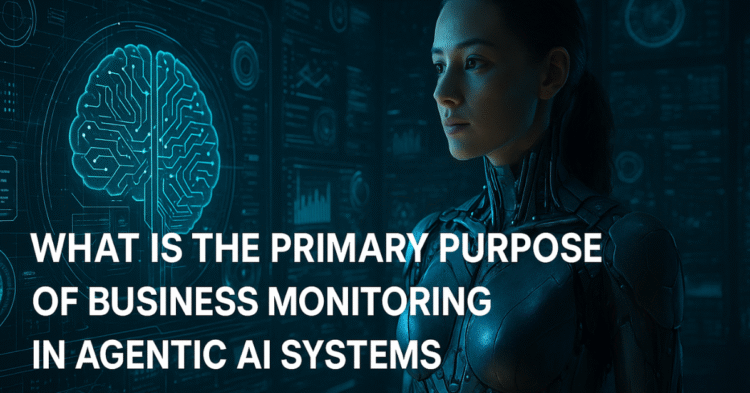Artificial intelligence (AI) has rapidly grown beyond being an automation tool to an active source of decision-making and business innovation. One of the biggest developments that it has achieved is the emergence of agentic AI systems —models that are autonomous and goal-oriented and can be run with limited human intervention. As compared to traditional AI that waits to be fed and performs predetermined tasks, agentic AI improves, learns, and makes real-time decisions.
However, this freedom raises a critical question, which is essential in any agentic AI system: what is the main objective of business monitoring?
The fundamental objective is simple but very important to achieve trust, compliance, efficiency, and alignment with business goals. These autonomous systems may not have a strong check and balance to ensure that they remain within the desired purpose, present compliance risks, or fail to provide transparency in their decisions. Through the embrace of robust monitoring systems, companies can reap the rewards of agentic AI without sacrificing security or responsibility.
This blog discusses business monitoring in agentic AI systems in detail, detailing its objective, advantages, obstacles, and best practices, and gives real-life examples that one can easily understand.
An Overall Understanding of Agentic AI Systems
We will first have a look at simple terms of agentic AI systems before we look at monitoring.
The difference between agentic AI and traditional AI is that, unlike a tool, agentic AI behaves more like a business partner. Rather than reacting to the inputs, it formulates goals, acquires knowledge through the results, and takes initiative in getting the results. Its key features include:
Autonomy—It can make decisions without close human supervision.
Flexibility – It gets a lesson in changing conditions and varies tactics.
Goal orientation – It works to achieve goals on its own, just like human agents.
Collaboration – It communicates with other systems, agents or even human teams.
An example could be within a supply chain where an agentic AI system may be able to realize an impending shortage, negotiate with suppliers automatically, and implement delivery-time adjustments without a human manager being involved.
Such autonomy is revolutionary and increases the necessity of control at the same time. Businesses often rely on an AI development company to build monitoring tools and frameworks that ensure these systems act responsibly while still delivering value.
An Understanding of Business Monitoring in AI
Monitoring a business is not new. Organizations have continually followed the performance indicators, a compliance measure, and workflow to ensure that everything runs smoothly. The difference today is that this monitoring is being applied to AI systems – particularly autonomous systems.
Traditional monitoring: Based on a human approach to performance, i.e., KPIs, employee performance, and financial performance.
AI-enabled monitoring: Monitors algorithms, provides ethical decisions, keeps data intact, and checks compliance in real time.
When it comes to business monitoring in agentic AI systems, the objective is to strike a balance—allowing AI to act independently while ensuring it doesn’t stray from organizational goals, ethical standards, or industry regulations. This is why companies today focus on building solutions that deliver both intelligent autonomy and robust monitoring frameworks.
Primary Purpose of Business Monitoring in Agentic AI Systems
Fundamentally, business monitoring is aimed at being responsible in its own autonomy. It is important since it serves the following objectives:
- Precision: Surveillance helps to check that AI results are consistent with the objectives that businesses have.
- Compliance: Oversight helps to ensure that decisions are made in accordance with the laws, industry standards, and the company policies.
- Efficiency: With output monitoring, a business can tell where there is a loophole and streamline the processes.
- Trust: Open monitoring will give the stakeholders the assurance that AI is doing the right thing.
This is why agentic AI business monitoring is not just optional—it is essential. Unmonitored AI can make decisions that are technically optimal but do not comply with or even reflect the ethical requirements.
An AI application in financial services, for instance, may focus on rapid approval but accidentally commit a violation of regulations, which creates legal exposure.
Advantages of Business Monitoring in Agentic AI
There are several advantages of investing in powerful monitoring frameworks for organisations.
Some of the major benefits of AI-driven business monitoring include:
- Better decision-making: Nondemocratic supervision means that results are precise and exact.
- More accountability: Businesses become transparent on how decisions are made, and this creates trust.
- Better adherence: Compliance means adhering to regulatory norms like GDPR or HIPAA.
- Increased efficiency: Ongoing monitoring will reveal bottlenecks and resources whose efforts are wasted at an early stage.
- Security reinforcement: The early detection of anomalies will aid in the prevention of breaches or fraud.
These advantages offer surveillance not only as a protective feature but also as a strategic benefit as well.
Key Use Cases of Business Monitoring in Agentic AI Systems
Monitoring plays an important role across different industries, with several practical AI monitoring use cases:
Finance
- Detection of fraud and control of transactions.
- Regulatory auditing against rules such as AML or Basel III.
Healthcare
- Securing vulnerable medical records.
- Assurance of ethical treatment recommendations.
Retail
- Monitoring customer behavior to achieve personalization.
- Controlling inventory and supply chain changes.
Manufacturing
- Machinery predictive maintenance.
- Quality assurance, adherence to safety standards.
These examples show how business management in AI can make sure that autonomy results in quantifiable business value and avoids risks.
Challenges of Business Monitoring in Agentic AI Systems

Even though it is an important aspect, business monitoring in AI is not always easy to implement. Some of the major challenges of monitoring agentic AI include:
- Data Privacy—Governance and compliance issues are frequently associated with monitoring sensitive data.
- Balance of Autonomy—Excessive supervision can diminish productivity, whereas insufficient supervision can augment the risk.
- Legacy Integration—Monitoring frameworks cannot easily integrate with older IT systems.
- Prices—More sophisticated surveillance systems require both technological and human resources.
These are some of the issues that organisations should pay close attention to when choosing between Agentic AI and Generative AI, as each involves different levels of monitoring and control.
Best Practices for Business Monitoring in Agentic AI Systems
To ensure success, businesses can adopt several best practices for AI business monitoring:
- Establish specific KPIs:Clarify the definition of success in quantifiable terms.
- Use live Dashboards: Make performance and compliance monitoring a continuous process.
- Make them explainable: AI systems are expected to be able to give coherent explanations of their decisions.
- Develop compliance structures: Industry-specific rules have to be incorporated into monitoring.
- Retain human control: Ongoing reviews ensure that there is no drift away towards business objectives.
By following these practices, businesses can achieve effective AI compliance monitoring while still enabling autonomy.
Future of Business Monitoring in Agentic AI Systems
Looking ahead, the landscape of business monitoring in agentic AI systems is evolving rapidly. Some key trends include:
Proactive monitoring—AI that can identify and resolve problems in progress.
Generative AI assistance—AI algorithms that support the generation of insights and the identification of anomalies.
Integration of blockchain —Incorporation of impartial, open-minded accounts of AI judgement.
Real-time AI business monitoring solutions —Providing instant feedback loops across industries.
AI control and regulatory controls will no longer be negotiable in the future, especially as companies increase their use of agentic systems within the industry.
Concluding Thoughts
So, what is the primary purpose of business monitoring in agentic AI systems? Its core is all about trust, compliance, accuracy and alignment. On the contrary, monitoring enables agentic AI to achieve its potential without reducing the level of ethics or rules.
By implementing business monitoring in agentic AI systems, organizations can strike the perfect balance between autonomy and oversight. And as businesses adopt these systems, those that prioritize monitoring through partnerships with an Agentic AI Development company will be better positioned to build long-term resilience, trust, and competitiveness.
In short, agentic AI business monitoring is the key to future-proofing enterprises in an increasingly autonomous AI-driven world.
FAQs
What is the importance of business monitoring in agentic AI systems?
Monitoring is one method of making sure that autonomous systems act responsibly, ethically, and efficiently. It discloses the need for business monitoring in AI through compliance, transparency, and alignment to business values.
What are the challenges of monitoring autonomous AI systems?
Privacy of data, autonomy versus oversight, high cost, and the challenge of integrating monitoring structures with existing systems are some of the biggest barriers.
What are the best practices for AI compliance monitoring?
Some of the main measures are establishing quantifiable KPIs, real-time dashboards, explainability, and human supervision. Following these best practices for AI business monitoring assists companies in reaching compliance goals while enabling autonomy.


















